
Live report: As Chris Hipkins concedes defeat, he tearfully thanks his family for their support through a 'very tough' year of floods, cost of living increases and an often bitter election campaign
12:41am: Both National's and Act's vote shares have eased through the course of the evening. National is now on 39.08 percent, giving it 50 seats. Act has dropped to 9.02 percent, entitling it to 11 seats. What this means is that the two-party government to which they'd aspired is looking a tad shaky. Winston Peters is very definitely not out of the picture yet.
Special votes must be counted and the official results for the election declared by November 3. That gives those candidates narrowly trailing in their electorates a chance to lodge a formal appeal, before the writ is returned on November 9. That's getting very close to the Port Waikato by-election on November 25, which National's Andrew Bayly should win on precedent.
But, but, but ... all bets are off for that by-election. One might expect it to be aggressively contested by Labour, NZ First and perhaps Act. I could be wrong, but Act's may have a decent chunk of its $1.8 million in donations left unspent, which might come in handy for the by-election.
READ MORE: * Election 2023: Charting the live results * Bittersweet election night wins for Greens * Te Pāti Māori rolls Labour in at least four seats * Gareth Hughes: NZ elects most right-wing govt since early 1990
In his victory speech tonight, National leader Christopher Luxon welcomed NZ First leader Winston Peters' assurance that he would be "willing to help where needed". Proffering that olive branch was wise, and seems like a leaf from John Key's playbook.
Luxon may well want to negotiate a support agreement with Peters, and offer him some policy wins. Because if at some point that slim majority is threatened – say, by new Rangitīkei MP Suzy Redmayne delivering on her threat to cross the floor on any abortion backsliding, or new MP Greg Fleming cross the floor in opposition to any Kiwirail line through his new Maungakiekie electorate – then Luxon may need New Zealand First. – JM

"Many of National’s policies such as city/regional deals, new water legislation and resource management will impact councils and our communities. We urge the new government to honour the localism approach they’ve been talking about. Putting the community first to face into the many challenges the country faces can shift the dial and make a meaningful difference. All parties have talked the talk on the campaign trail – it’s now their chance to walk the walk. We look forward to working closely with our new Ministers on those policies and more.”
12:13am: There are a number of electorates still too close to call: Te Tai Tokerau has Labour’s Kelvin Davis just 363 votes ahead of Te Pāti Māori’s Mariameno Kapa-Kingi with 93.8 percent of the vote counted. Last election, special votes favoured Te Pāti Māori, so this could be one that will only be settled once all out-of-electorate votes are counted.
Meanwhile, Mt Albert remains a nail-biter with National’s Melissa Lee just 91 votes ahead of Labour’s Helen White. A National win would be a first for Mt Albert in its 77 years of existence.
National’s Chris Bishop is just 784 votes ahead of Labour’s Ginny Andersen in Hutt South, with just a whisker under 90 percent of the vote counted.
In Banks Peninsula, National’s Vanessa Weenink is just 70 ahead of Labour’s Tracey McLellan. Phil Twyford’s more than 10 years as MP for Te Atatū may be in jeopardy with National’s Nicholas Angee just 169 votes ahead of him.
But the smallest margin at the moment is the razor-thin 54 votes putting National’s Blair Cameron ahead of Labour’s Tracey Boyack in Nelson. All votes are counted in Nelson but such a small margin could be turned by special votes. – Matthew Scott

‘Tomorrow NZ is going to wake up to not only a new day but a new government and the promise of a new future.’ – Christopher Luxon, National leader
11:46pm: Labour deputy leader Kelvin Davis has reclaimed the lead by the slimmest of margins in the northern Te Tai Tokerau electorate. Te Pāti Māori's Mariameno Kapa-Kingi had been ahead for most of the evening. The impact of that will be to reduce the size of any overhang created by the Māori seats to just one seat. We're on track to a Parliament made up of 121 MPs at the end of tonight, and another will take it to 122 after the Port Waikato by-election on November 25. – JM
11:40pm: For what it's worth, the Greens have taken a lead over the Act Party in the ongoing vote count – and the Parliamentary seat count. The Greens are now on track to return 14 MPs to Parliament; Act will take 11 MPs into government. – JM
Track the live results for Election 2023 here. Graphics update every five minutes with the latest on seats won, battleground electorates and the party vote. Refresh the page to get the most recent results.
11:33pm: New Zealand's new youngest MP, 21-year-old Hana-Rawhiti Maipi-Clarke of Te Pāti Māori, tells RNZ that taking the concession call from Nanaia Mahuta was "heartbreaking", because Mahuta has been an inspiration to her.
Her great grandmother Hana Te Hemara delivered the Māori language petition on the steps of Parliament in 1972. Now Maipi-Clarke is New Zealand's youngest MP since 1853. She says getting her foot in the door of Parliament is an honour for her, for her whānau and her ancestors.
She believes the threats and abuse she faced during the campaign are the worst any candidate has faced. Even for the oldest and most experience politician, she says, "everyone has some fear".
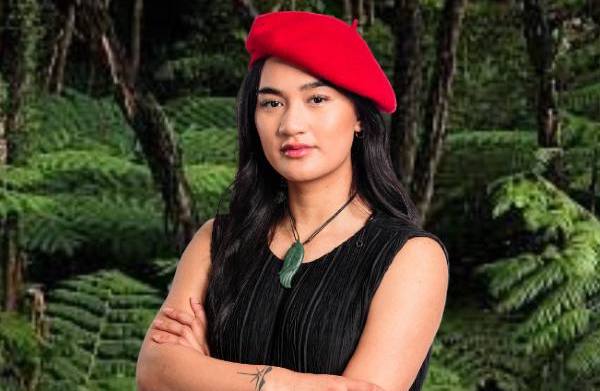

11:19pm: National leader Christopher Luxon has made his way through ecstatic crowds to the stage. "I am immensely proud to say that on the numbers tonight, National will be in a position to lead the next Government. And my pledge to you is that National will deliver for every New Zealander.
"We will bring down the cost of living, we will restore law and order, we will deliver better healthcare and we will educate our children so they can grow up to live the lives that they dream of.
"Earlier this evening I took a call from Labour leader Chris Hipkins conceding the election. And I thanked him for the call and I thanked him for serving New Zealand as Prime Minister.
"On current numbers it looks like National and Act will be in a position to form the next government."
He welcomed NZ First leader Winston Peters' assurance that he would be "willing to help where needed".
"We have splashed the country blue ... I cannot wait to get stuck in and get to work.
"Tomorrow morning New Zealand's going to wake up to not just a new day but the promise of a new government and a new direction." – JM

"The fact that formerly solid red electorates like Mt Albert, Mt Roskill and Te Atatu look to be at risk will be sending a shiver down Labour's spine but probably reflects the broader Auckland electorate view about some of the poor decisions made by Labour at the back end of Covid.
"A National Act Govt without NZ First probably means less friction over key policy areas such as immigration and foreign direct investment – although NZ First's rhetoric around these areas had already started to become more nuanced in the final week of the campaign. There's still some water to go under the bridge but the die looks cast – Blue, and Yellow."

"The reality is he probably did as well as anyone could have done. When petrol costs $3 a litre, there’s no way that the incumbent government is going to find it easy to be re-elected. And Labour just didn’t have the answers for those issues. It’s curtains for him, though. There’s no way he can come back from this, be the leader of the opposition for six or even nine years, and then say “I represent change.”
11:10pm: Chris Hipkins tells RNZ that there are a lot of "significant blows" for Labour, its MPs and its candidates tonight. "It's been very tough."
He's not going to rush any decisions on his leadership. He'll talk to his colleagues and play a constructive role in discussions. "We haven't even started to have those conversations."

11:05pm: Asked if he's happy with NZ First's 6.4 percent of the party vote so far, Shane Jones says it was an "enormous relief" for the party to find its way back into the landscape of Parliament.
"As things stand, it's difficult to envisage how we might play a role in government .... but this is the rise of the phoenix for the third, potentially the fourth time."
He says was necessary to wait for the final count, but in the meantime pointed out the "extraordinary" developments in the Māori seats.
"Labour in my view lost so much political capital because the leadership of Labour never went out and argued for their thesis underlining co-governance."
The outcome of that was Te Pāti Māori capitalised on it and turned it into a "cause célèbre", he says. – CM
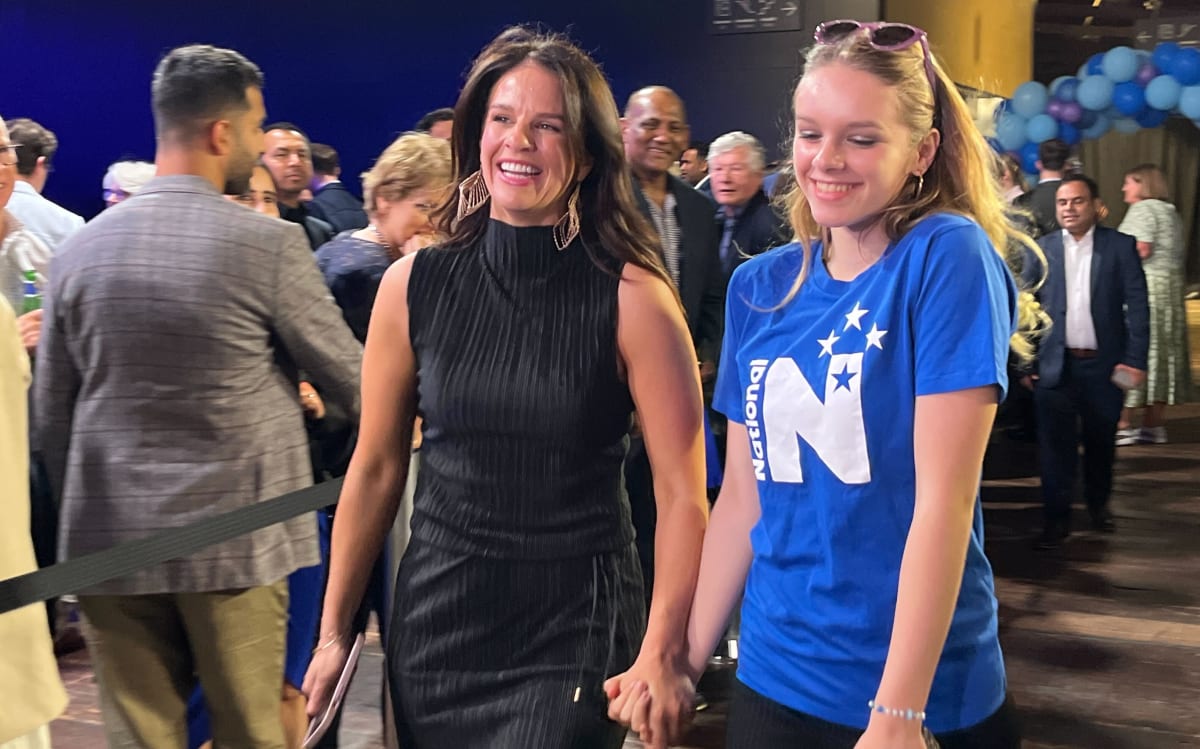
10:55pm: Act Party leader David Seymour is speaking to media. "This country has a lot of very very serious problems. Act has put forward solutions."
10:45pm: Chris Hipkins hasn’t said whether he plans to stand down as Labour leader in the wake of the election loss. Speaking to reporters, he said the caucus “just need to take a little bit of time. So we’ll take the time to do that and to reflect and then, you know, decisions about the future are for another day.”
The Cabinet of the Sixth Labour Government will meet on Monday for the last time. Hipkins said he had told Luxon this evening that the caretaker government would take his direction on any decisions that need to be made in the period before a new, National-led government is formed. Casting forward to being in Opposition, Hipkins said the caucus remains unified. – Marc Daalder
10:37pm: "Chippy, Chippy, Chippy!" That's the chant from Labour faithful in Lower Hutt as Labour leader Chris Hipkins takes the stage.
Hipkins confirms he has called National leader Christopher Luxon and congratulated him. "As it stands Labour is not in a position to form another government."
"Despite the challenges New Zealand has faced, we kept New Zealand moving forward and we protected those who needed help the most."
"Becoming Prime Minister earlier this year was the honour of my life. I did know when I took on this job that it was going to be an uphill battle." – Chris Hipkins, Labour leader
"We raised 77,000 kids out of poverty despite a global economic downturn. We reduced out emissions three years in a row, finally bending the curve on climate change. We built 33,000 homes, the most of any Government since the 1950s."
"Becoming Prime Minister earlier this year was the honour of my life.
"I did know when I took on this job that it was going to be an uphill battle. No government has replaced a prime Minister in election year and carried on to win. And we had the added challenges of flooding and cost of living.

"I gave it my all to turn the tide of history, but alas, it wasn't enough. In the coming days we will do our best to ensure a smooth transition of government
"We now have a new and important role in Parliament, to hold the Government to account and stand up for those who are going to be affected by these cuts.
"We will be fighting for working people – because that is our history and our future.
"When the tide comes in big, it goes out big as well. That is the nature of politics ... but we will get up like we have many times before.
"Thank you New Zealand for the honour and the opportunity you have given us to serve and move New Zealand forward."
Hipkins breaks down in tears as he thanks his family – and the chant resumes. "Chippy, Chippy, Chippy ..." – JM

"I’ve had so many messages coming in from people leaving the polling places because of the long queues or being asked for proof of citizenship and not being allowed to vote without an EasyVote card. They’ve been running out of forms all over south Auckland, which mostly votes Labour. I agree with Rawiri Waititi calling for a Māori electoral commission."
1

10:20pm: This is just how blue the country's general electorates look at this point in the evening. Thanks to Marc Daalder for our graphics tonight.
Track the live results for Election 2023 here. Graphics update every five minutes with the latest on seats won, battleground electorates and the party vote. Refresh the page to get the most recent results.
10:19pm: David Seymour is speaking at the Act Party HQ in Auckland's Viaduct. He says a new National-Act government will be a chance to do good.
"Act will work tirelessly to ensure this country delivers its promise for so many people who have chosen to be here," he says. "Rich and poor, we are all New Zealanders who have chosen the opportunity this country offers."
He pays tribute to his deputy Brooke van Velden, who has won the Tāmaki electorate, and says she will be loyal servant of that electorate.
"New Zealand is the best little country that can," he says. there is a better tomorrow and we get to work on making it happen, not just change, but real change."
10:18pm: We’ve been speaking to Labour Party campaign manager Megan Woods, near the entrance of a bustling Linfield Cultural Recreational Sports Club, in Bromley, Christchurch. Her straight reaction on the numbers: “It’s a tough night but we’re around 40 percent of the vote counted, I think, nationally.
"What we do know is that Labour’s real surge and pick-up in momentum has happened in the last few days. So many of these votes that have been counted, a vast proportion of them were the early votes. Some of those were cast 10 days ago. What we’re seeing as some of the booth votes are coming through, from the booths today, we’re actually seeing Labour pick up, particularly in some of the seat contests, and some of the party vote. I’ve been obviously been watching the Christchurch results pretty keenly and we’re seeing some of that party vote tick up in those seats. So I think there’s still a long way to go.”
She's leading by only 737 votes in the longtime red seat of Wigram. Is she surprised at the close race in her seat? “No. This was always going to be a really tight election. I first won Wigram with 1500 votes so this isn’t new territory for me, and I think everyone knew that the results of 2020 were never-to-be-repeated majorities.”
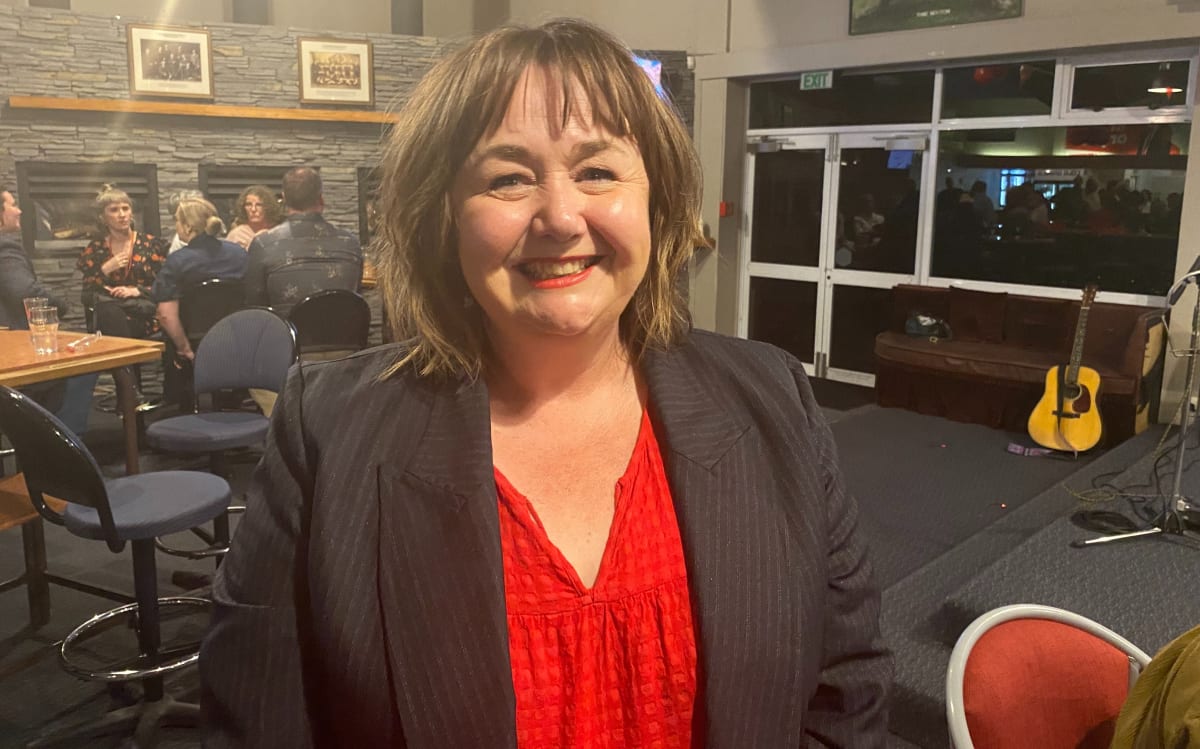
Labour faces losing 30-odd seats – she'll be losing friends and colleagues. “Absolutely, and it’s a tough night. I need to sit down and fully digest how things are tracking in various races around the country. Look, it’s always tough when you do lose those friends and colleagues. Here in Christchurch I think the one that we could call is probably Ilam, that Sarah Pallett won’t be back on those numbers. Sarah was an incredibly hard-working MP for Ilam. What we are seeing is really the vote split equalling Hamish’s vote there.”
"Without doubt cost of living was a huge part of this campaign. But equally I think the economy did feature in terms of people having to analyse what was in it for them. I think there was quite a bit of confusion for people through the campaign on this. As I said, this is all post-match analysis and we’ll have to get into that later."
Will there be a new Labour leader? “Way too soon.”
"I think Chippy did a remarkable job. He’s come in seven months ago, taking over from a phenomenal leader in Jacinda Ardern and has done a phenomenal job himself. A difficult ball to pick up for anyone – we seem to be using a lot of sporting analogies here – but he’s done an incredible job." – David Williams
10:17pm: Newsroom's live results page will keep you up-to-date on the latest election figures on what promises to be a very tight election night
Track the live results for Election 2023 here. Graphics update every five minutes with the latest on seats won, battleground electorates and the party vote. Refresh the page to get the most recent results.
1
"National was the big winner in 1990, winning seats it would not hold onto beyond that election. The same happened with Labour at the helm in 2020, winning seats no one ever dreamed they would win. The fact that those seats have returned to their natural constituency is no reflection on the hardworking electorate MPs, who were never going to get cut through in the publicity stakes as government backbenchers.
"In 1990, I was one of seven new MPs in a caucus of 29 in a Parliament made up of 97 seats. It was the biggest electoral defeat Labour had suffered since it was first elected. In 1993, in a major comeback, Labour won 45 seats to National’s 50.
"I know what it feels like to enter Parliament in the wake of a major defeat. It will be natural to want to study the entrails. My message is that the focus must quickly turn to rebuilding the party. A strong opposition is essential to a functioning democracy and that must be their immediate priority no matter how much it must hurt."
10:01pm: A former Maori issues correspondent for RNZ, Chris Wikaira (Ngāti Maniapoto, Ngā Puhi) is now a director of public relations company BRG, specialising in Maori communications services. "Labour’s Toni Boynton has just conceded in the Maori electorates of Waiariki (Bay of Plenty) ," he writes. "Te Pāti Māori’s Rawiri Waititi had a strong lead in the polls. He now looks on track to win three-quarters of the vote. Boynton has thanked supporters. She says she knew she had a tough gig coming into this. 'But I thank all those who got out and voted for me and Labour.'
"Te Pāti Māori is tracking toward taking out five or six of the seven Maori electorates. That was not expected. It would mean, veteran Labour MPs Nanaia Mahuta and Rino Tirikatene will exit Parliament.
"The last time Labour was hammered so hard in the Māori electorates was in 1996, when NZ First took all five electorates. Professor Lara Graves from Victoria University says this is very 1996 energy in the Māori seats.
"Te Tai Tonga MP Rino Tirikatene, who had looked unassailable in the southern electorate, tells Whakaata Māori TV: 'Sometimes the tide comes in and lifts you up. Sometimes the tide goes out'."
10:00pm: Green co-leader Marama Davidson and James Shaw have arrived at the party's election HQ in Auckland to overwhelming applause. They're on track to win two or three electorate seats – Chlöe Swarbrick in Auckland Central, Tamatha Paul in Wellington Central, and perhaps Julie Anne Genter in Rongotai. But with 13 seats in total, they haven't done quite as well as the 15 seats some polls promised.
Marama Davidson is speaking to supporters. “Your work has delivered a Green Party campaign that has defied history ... Oh my goodness massive congratulations to Tamatha Paul. Earlier this evening people were saying Wellington Central was a Labour stronghold but it is looking more and more likely it will elect a Green, and holy heck, Julie Ann Genter, she set out to turn a so-called Labour stronghold Green.
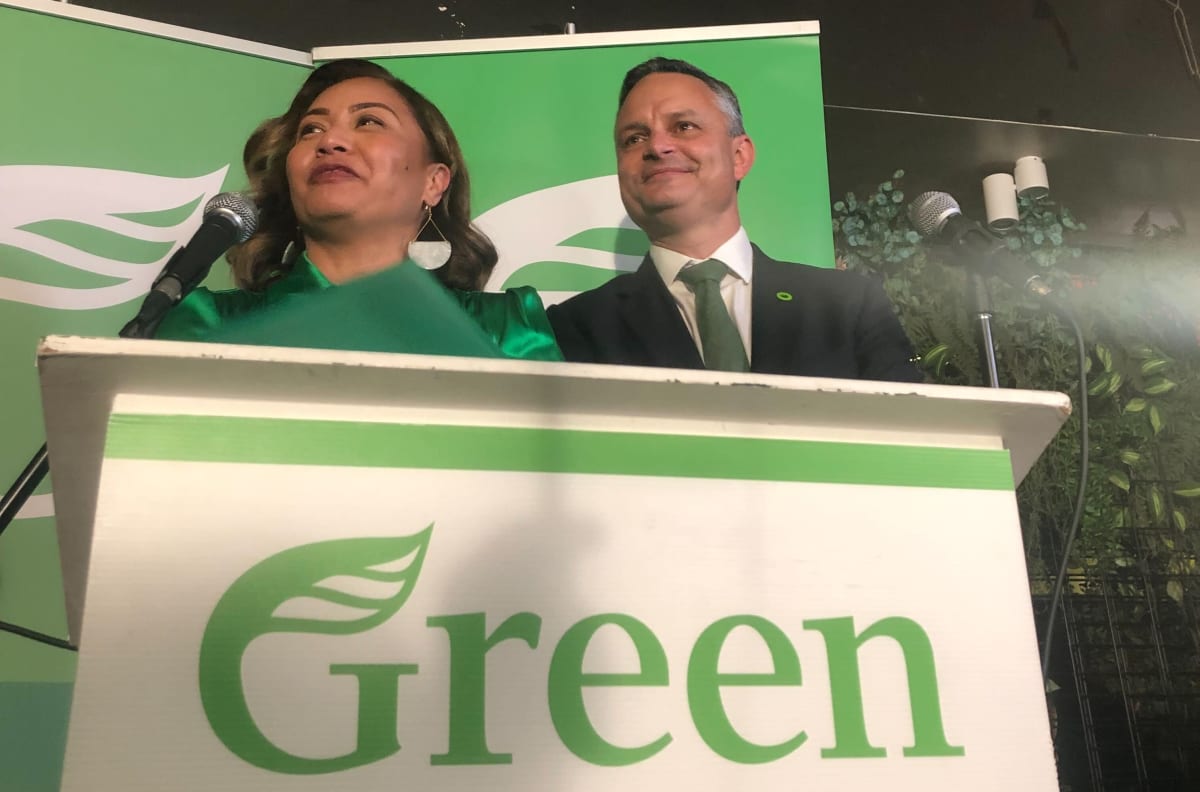
"And what about Chlöe Swarbrick… listen up – Chlöe and her team won Auckland Central in the face of a red wave and she looks set to hold it in the face of a blue wave. We have defied political history again ... the Greens have not once, but twice grown our support after being in government ... this is unheard of.” Davidson also congratulated Te Pāti Māori and their success in the electorates tonight. James and I are happy to give advice on co-leading a Māori caucus."
Davidson tells supporters that this is the first time a minor party supporting a government has improved its vote – and they've done it against a blue tide. – Emma Hatton
9:58pm: Winston Peters is on the big screen at National Party headquarters but being completely ignored by the blue team, who will be holding out hope they don’t need NZ First to form a government. Carlos Cheung isn’t counting his chickens yet but is feeling good about being ahead of Michael Wood in the safe Labour seat of Mt Roskill. – Jo Moir


We will be very keen to discuss the options with National Act so the residents of westport can be protected and future proofed for climate change.
9:50pm: Our South Island editor David Williams has been speaking to Labour Party campaign manager Megan Woods, near the entrance of a bustling Linfield Cultural Recreational Sports Club, in Bromley, Christchurch. Her straight reaction on the numbers: “It’s a tough night but we’re around 40 percent of the vote counted, I think, nationally. What we do know is that Labour’s real surge and pick-up in momentum has happened in the last few days. So many of these votes that have been counted, a vast proportion of them were the early votes. Some of those were cast 10 days ago. What we’re seeing as some of the booth votes are coming through, from the booths today, we’re actually seeing Labour pick up, particularly in some of the seat contests, and some of the party vote. I’ve been obviously been watching the Christchurch results pretty keenly and we’re seeing some of that party vote tick up in those seats. So I think there’s still a long way to go.” – David Williams
9:49pm: National Council of Women president Dr Suzanne Manning has written in, in reply to our analysis of how many women will be in Parliament. Newsroom is estimating as few as 53 women in a parliament of 121, down from an unprecedented majority of 61 women last year: "While we look forward to working constructively with whichever parties make up the next Government, it is disappointing that it appears the number of women MPs has dropped, which we see as a backward step," Manning says. "Our recent Gender Attitudes Survey showed that there is still a lot of work to do to achieve genuine equality in Aotearoa New Zealand."

9:38pm: Chlöe Swarbrick is speaking to press about her current 1542 lead in Auckland Central. She said she was proud of the campaign she had run, but gave credit to her army of volunteers. “It wasn’t just me, I’m the face, I’m the name on the post, but it was the thousands of volunteers.” She said as MP, “no one will ever have to guess what she or Wayne Brown are thinking” and she will prioritise her consideration for people on the bottom. She also commended Tamatha Paul’s good vote take in Wellington Central, and said she had been trying to get Paul to run for years. “I am just phenomenally proud of having a little bit to do with supporting Tamatha Paul.” On the Greens' party vote, which so far is lagging behind what the polls suggested: “It’s relatively early in the night... convention’s totally out the window at this point.” – Matthew Scott
9:35pm: Last year, New Zealand had 61 women MPs – the first time ever there had been a majority of women in Parliament. It's looking very different this time. To be blunt, tonight is the biggest backwards step in women's representation since Kate Sheppard and her suffragists won women the vote in 1893.
On current numbers, I'm forecasting as few as 16 women MPs for Labour, making up half of a caucus of 32 MPs. To put that in perspective, they had 37 women elected at the last election in 2020. The only women to be returned on the list this time will be ministers (or should we say, outgoing ministers) Carmel Sepuloni, Jan Tinetti, Ayesha Verrall, Willow-Jean Prime, Priyanca Radhakrishnan and – if she fails to hold her Wigram electorate, Labour campaign chair Megan Woods.
National's representation of women will be just as dire, though for very different reasons. National of course is on track to win about 53 seats, but because of the control its electorate organisations have over selecting candidates, leader Christopher Luxon has failed abysmally in his hopes to bring a fresh-faced, bright-eyed, diverse caucus back to Parliament. Instead, 17 of the 18 bottom-ranked conservative men (numbers 53 to 70 on their party list!) will win their electorates. Among the upsets, Mike Butterick looks set to win the Wairarapa seat off strong-performing Cabinet minister Kieran McAnulty.
This emphatic performance in electorate races means, perversely, that very few of Christopher Luxon and Nicola Willis' handpicked slate of women, Māori, Pasifika, Asian and LGBTI+ candidates will make it into Parliament on the list. What this means is that only about a third of National's big new caucus will be women – about 18 of them. The only women to get in on the list look likely to be Melissa Lee, Nancy Lu, Agnes Loheni, Emma Chatterton, Harete Hipango and Rosemary Bourke. There's a question mark over whether Nicola Willis will come back on the list or will win Ōhāriu – she's very close to overturning Greg O'Connor's massive 11,900 majority.
These numbers will be improved by the representation of women in the smaller parties – the Greens are on track to bring back seven women in a caucus of 13. Extraordinarily, as well as Chlöe Swarbrick in Auckland Central, Green candidates Julie Anne Genter (Rongotai, with a narrow margin of 99 votes) and Tamatha Paul (Wellington Central, with a big margin of 3000) are both leading in their electorates.
The Act Party is on track to elect six women in a caucus of 12, and NZ First could bring back three women in a caucus of eight.
If Te Pāti Māori really does pull off the feat of winning six electorates, then four of their MPs will be women. But on the latest count, Labour's Peeni Henare has snuck back in the lead in Tāmaki Makaurau to reduce Te Pāti Māori to a still-respectable five MPs, and among them three women.
So what's that add up to? If Peeni Henare holds Tāmaki Makaurau outcome, we're looking at just 53 women MPs in a Parliament of 122. (Which is, incidentally, the same number I predicted in my Newsroom Pro editorial last week) – JM
9:32pm: “A mood for change” is a hard thing to fight, Labour minister Ayesha Verrall said to Newsroom tonight. “What does that even mean? Underneath that, there’ll be a lot of factors and a lot of different opinions.” In light of that, there’s no one thing Labour could have done to bolster its campaign, she thinks, looking at the number of seats where it is struggling. She also said the night’s not over and she’d been told to expect a worse initial showing for Labour off the back of the advance votes and then a steady rebalancing as today’s votes get counted. – Marc Daalder
9:29pm: Brooke van Velden has arrived to a hero's welcome at Act Party HQ. Now almost certain to be the new MP for Tāmaki, van Velden received rapturous applause as she was hugged by other Act MPs and supporters. Van Velden thanked those who worked on her campaign and said they had held 130 street meetings in the electorate and deserved the credit for her success. She said she couldn't wait to get back to Wellington and start working for the people of Tāmaki. – Mark Jennings
9:27pm: Carlos Cheung, ahead by 1563 votes for the National Party against former minister Michael Wood in the fortress of Mt Roskill, arrives at the National HQ at the waterfront to a hero’s welcome and big hug from Melissa Lee, his fellow usurper in another Labour seat, Mt Albert. All early days but one party’s fizzing over those inner west results. – Tim Murphy

"This is clearly a change election but exactly what the government change looks like is still uncertain. National relentlessly hammered a message of change that has clearly resonated with voters and as a result, they have out-performed recent polls. It is a disastrous result for Labour who look almost certain to have gone from an unprecedented MMP majority to be the first government to fail to do three terms since the 1980s. The Greens have avoided the fate of a long-list of support parties in MMPs Governments who have either shrunk or disappeared entirely from Parliament and will be celebrating electorate victories. Te Pāti Māori have had a blinder of a night and the dearth of electorate polling shows their massive momentum wasn’t picked up by the traditional media which means the overhang could be an important electoral concept many Kiwis will be waking up to tomorrow."

9:15pm: Grant Robertson has made a brief appearance before returning upstairs, beer in hand. He said Labour is not where they’d like to be at this stage in the night, but there are more votes still to be counted. The party’s new theory is that the initial wave of advance votes that came through early in the evening will have leaned away from Labour, since they’ll date from before the much-vaunted “surge” or “momentum” Chris Hipkins touted this week. As today’s votes continue to trickle in, they’ll lean more towards Labour, Robertson suggested. – Marc Daalder


"If that would be the case they would find themselves in the same boot with a lot of social democratic parties across Europe who over the past decade have massively lost young and highly-educated middle-class voters to the green parties because they have been late adopters of topics such as climate change and LGBTQ+ rights, and progressive policies in these areas matter a lot to young and highly-educated voters and these topics are 'owned' by the Green parties."
9.07pm: Debbie Ngarewa-Packer says she is “overwhelmed” as Te Pāti Māori pulls ahead in five of seven seats with just over a quarter of votes counted. – Aaron Smale
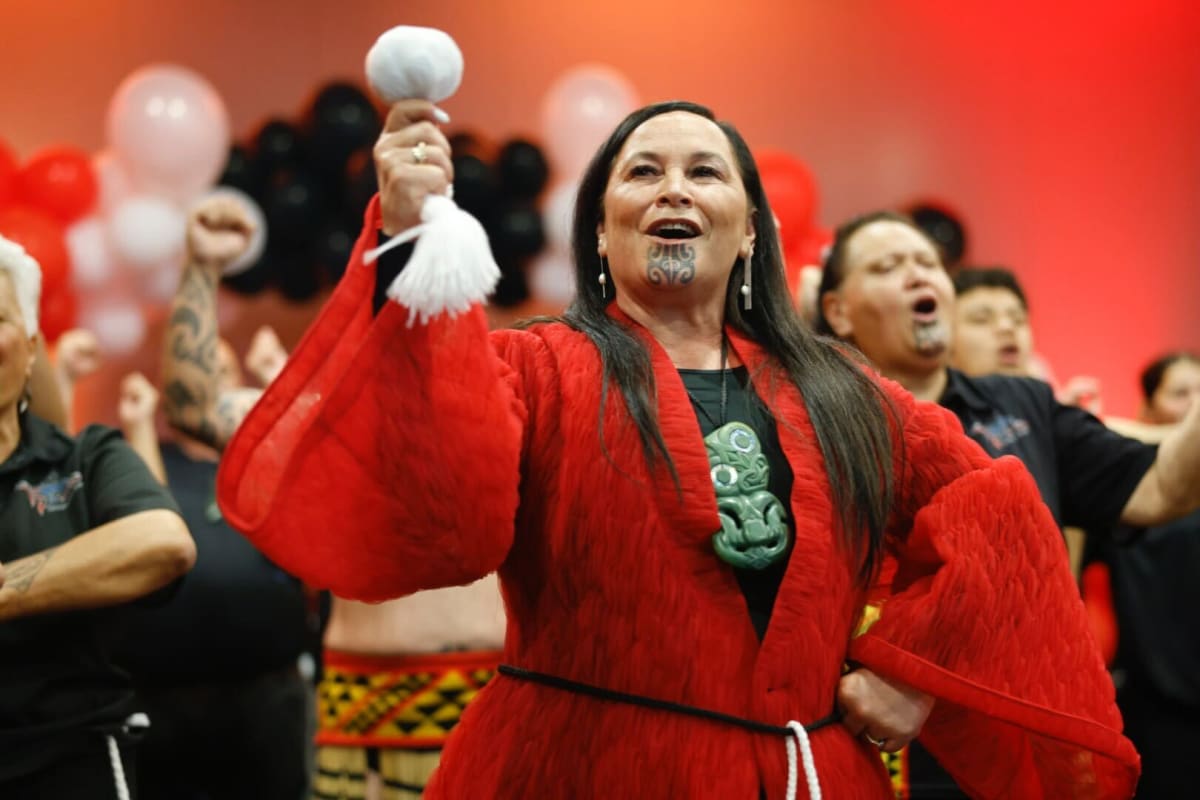

“Thoughts start moving to portfolio allocations in a National-Act government and the likely 100-day plan, particularly in simplifying the environment for businesses. Also we are keen to see early progress on encouraging foreign direct investment. My travels to China and India this year indicate continued interest, and at a more nuanced level, in investing in New Zealand. But investors want to see a simpler more straight forward investment environment and a fit-for-purpose investor migrant scheme. The value this could unlock for New Zealand is significant. As predicted, it looks like a blue wave in the regions but the urban swing to National also looks significant even in traditional Labour seats, helped by Labour votes moving to the Greens. The Māori seats will be interesting.”
8:56pm: A big cheer rings out as the results for Ōhāriu show up on the screen at Labour HQ. It’s one of the few cheers of the night. With 41 percent of the vote counted, backbencher Greg O’Connor is narrowly ahead of National’s deputy leader Nicola Willis. It’s a margin of 300 votes – about 1.5 percent. I spoke to O’Connor a couple of minutes before that, who said the tightness of the race was “entirely predictable. Half an hour ago, I was interviewed and I was about 300 behind. I made the comment that I’d much rather have been 300 ahead, so it’s better to be ahead than behind.”
On Labour’s performance more broadly, O’Connor says he’s not surprised by the overall result but thought it might be a bit higher. “There was a bit of hope that there’d been a bit of a turnaround in the last week or so. I’ll be honest, I thought from what I was picking up on the doorsteps in the last couple of weeks that we’d moved up two or three points and that we would end up a lot closer to 30 percent.” With specials and 70 percent of the vote still to be counted, O’Connor is hopeful still that Labour will bump up a bit. He says there are Labour MPs on the list who are hovering around the cut-off mark who New Zealand needs to have in Parliament, naming Kieran McAnulty (currently 1000 votes behind in Wairarapa) as an example. – Marc Daalder, Labour HQ
8:54pm: Professor Paula Lorgelly, chair of health economics at the University of Auckland, says it won't be just a win for National and Act but also big pharma. The promised policies on funding cancer drugs and overhauling medicines access will be welcomed by pharmaceutical companies who can now supply 13 new cancer medicines and will likely get expedited access to the medicines market. Cancer patients and patient advocate groups will think this is a win, but it will come at the expense of attempts to improve access for all and tackle health inequities.

"They give us some sense of how well or not voters understand how dramatically and fast the world (and NZ) is changing … and therefore how urgent/not urgent is the need for progressive/regressive politics and policies. With some 30 percent of the vote counted, the Greens just lead Act on proportion of votes and on seats and will pull further ahead, particularly when special votes are counted, if past counting dynamics hold up this time. Of course, the stronger the Greens and Act perform in this election, the more likely Labour and National will have to better align their policies with the very fast changing world between now and the next election."

8:33pm: In Lower Hutt, the Labour election party has finally filled out and the mood is clearly glum, but not of surprise or shock – a poor result was always in the works. One suspects the bar is doing very good business. MPs are still few and far between. Ginny Andersen, seeking election in Hutt South, made a brief appearance but then left to “catch her breath”. She’s currently trailing Chris Bishop by 600 votes, with 33 percent of polling places reporting.
Backbencher Naisi Chen is here, conceding that it’s not the result they were hoping for. Taking a broader view, both Labour and the Greens were underperforming in the most recent polls, on current results. The Greens are around 2 points down from where they were in Newsroom’s polling average on the final day of the campaign and Labour is down 1.5 points. The only silver lining for the left might be Te Pāti Māori’s strong showing – they are currently ahead in six of the seven Māori electorates. – Marc Daalder
8:32pm: If Te Pāti Māori were to win four or more seats, they might well create an overlap, because they'd have more electorate seats than the 2.5 percent party vote share would entitle them, on proportional grounds.
On current numbers, those six seats would add three overlap seats to Parliament. The Port Waikato byelection would create a fourth – meaning the Parliamentary Service would have to pay the salaries of 124 MPs for the next three years. – JM
8:26pm: Brooke van Velden is wearing a big grin on her face, 2500 votes ahead in the long-time National Party stronghold of Tāmaki. Speaking to supporters, she insists it's still early in the night – but that's a very healthy lead with 41 percent of the vote counted. – JM
This would give Act a second Auckland seat, alongside the Epsom seat held by leader David Seymour.
8:25pm: Senior National MP Paul Goldsmith has arrived at headquarters and says it's a "promising start" but there's still a way to go. "Early signs are that things are looking good."
With a number of safe Labour seats being flipped blue on current numbers, Newsroom asked if this was looking like a 2020 Labour landslide in reverse.
Goldsmith said "it's interesting isn't it, I'm not entirely surprised as there were a range of options, and this is looking positive so far." – Jo Moir, National HQ
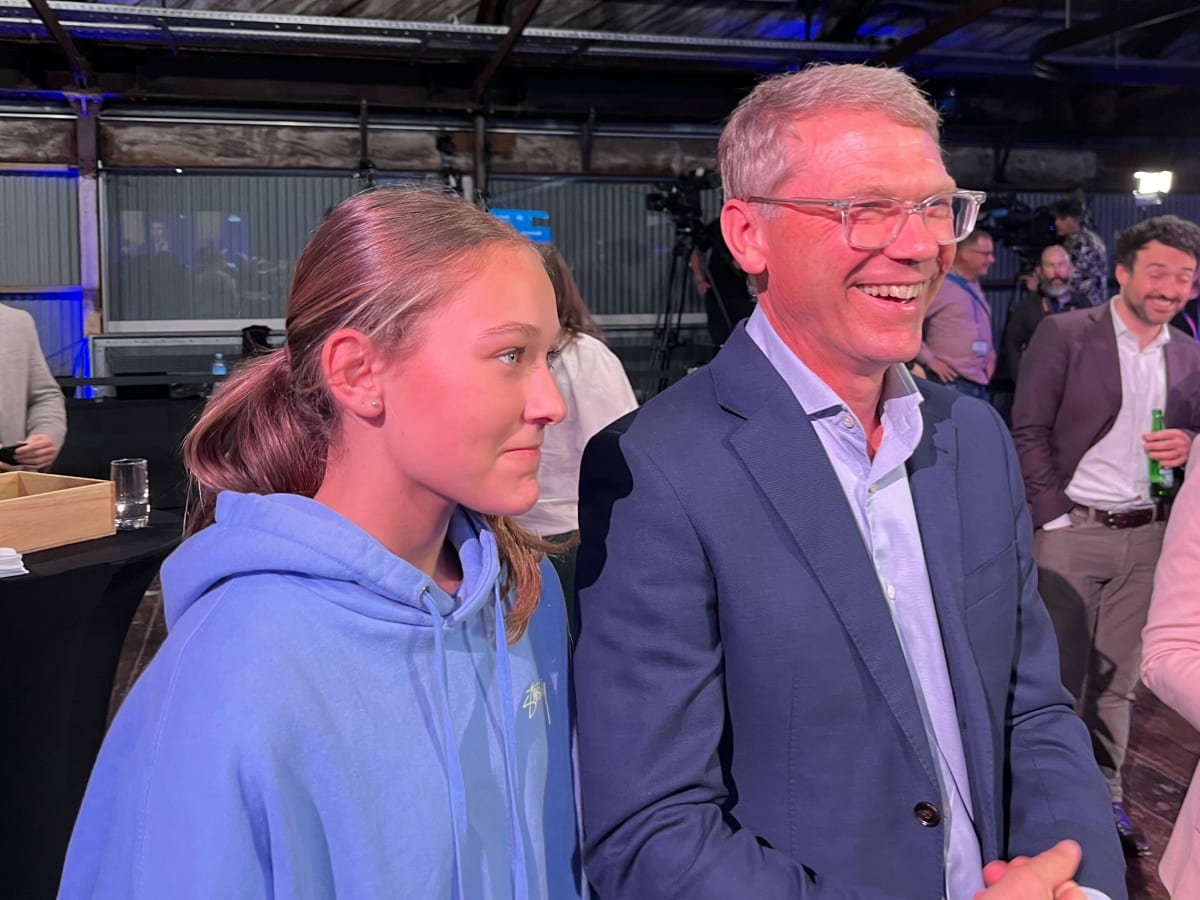


8.21pm: The University of Otago's Michael Swanson says Labour "will not be happy".
"The current results would almost halve the number of MPs from the 2020 result – they look to be floating around the 26 percent mark – worse still, this means losing a number of hugely experienced people from their next caucus. The Greens, on the other hand, are looking at one of their best results in their history, especially as they often receive a bump from special votes which will be added after tonight. Even if they aren’t in government, growth for the Greens mean they will have a really strong caucus to head into opposition with."
8
"Labour has alienated people like me. I’ve cut up my life members card – and I’m left to the bottom of my heart. The race to the middle has made me sick. The lack of debate about the challenges facing our planet, and a sense of hope for the future, causes me to say, bring on difference. It’s time for a change in politics and I hope these numbers scare the hell out of people so that they demand left parties to start thinking about the planet and its future.
"The great thing about the early results is that we may have a Government elect which is dumb and maintainers of the status quo. The very elements our country needs less of, rather than a sense of hope for the future."
8:15pm Senior National MP Mark Mitchell tells RNZ that it's still early days, but they're very happy with where the vote is sitting at this stage. "Chris made it very clear our preference was to have a strong two party centre right government. At the moment, if that's what the voters of New Zealand have given us, then we're going to be extremely thankful for that." – JM
8:10pm: This is the big surprise of the early evening: Everyone laughed when Te Pāti Māori co-leader Rawiri Waititi said the party would win six or seven seats – but right now, he might not be too far wrong. On very early counts, Te Pāti Māori is leading in six of the seven Māori electorates: Rawiri Waititi in Waiariki, Mariameno Kapa-Kingi ahead of Labour deputy leader Kelvin Davis in Te Tai Tokerau, Takutai Tarsh Kemp ahead of Cabinet minister Peeni Henare in Tamaki-Makaurau, Hana-Rawhiti Maipi-Clarke leading Foreign Affairs Minister Nanaia Mahuta in Hauraki-Waikato, Debbie Ngarewa-Packer in Te Tai Hauauru, and Tākuta Ferris in Te Tai Tonga.
If they were to win four or more seats, they might well create an overlap, because they'd have more electorate seats than the 2.5 percent party vote share would entitle them, on proportional grounds. On current numbers, those six seats would add three overlap seats to Parliament. The Port Waikato byelection would create a fourth – meaning the Parliamentary Service would have to pay the salaries of 124 MPs for the next three years.
Rawiri Waititi has just arrived at his electorate headquarters in Wairaiki, to be greeted with a powerful haka. – JM
8:07pm: The most tantalising possibility in the National camp at the moment is Mt Albert. List MP and candidate Melissa Lee is leading Labour’s Helen White in the rock solid Labour seat that once, under Jacinda Ardern, had the country’s highest majority in 2020. Lee is 420 votes ahead after 30 percent counted –Tim Murphy
8:06pm: Huge cheer erupts at Act as TV screens show deputy leader Brooke van Velden more than a thousand votes ahead of National's Simon O'Connor in Tamaki – Mark Jennings

"Roading is the biggest priority I hear from Far Northerners about day in day out – we have 2,507 kms of roads in the Far North so will be interesting to see how the potential new government will live up to addressing the funding challenges we have to get our roads up to standard - both local and national! One of the other big issues for us is Three Waters. We have 16 wastewater treatment plants and 8 water schemes in the Far North. Our infrastructure deficit bill is over $600 million to brings these all up to scratch. Under Labour, that cost was going to be cross-subsidised across Auckland/Northland – under National, we aren’t sure yet what their alternative of ringfencing how much funding we will have to spend on Three Waters will mean for our books. We could spend 100 percent and it still won't be enough."

On Mt Albert: "It is interesting to see Helen White losing the preliminary vote (at 30 percent). Mt Albert is a Labour seat, and it’s devastating for the Labour Party that Melissa Lee is winning in the preliminary count. Ricardo Menéndez March may have split the vote in this instance: he ran a significant on-the-ground campaign, and his volunteers did far better than Helen White’s campaign. This result has implications for the Green’s wider strategy of trying to win electorate seats: all eyes will be on Tamatha Paul’s Wellington Central electorate race to see if their focus on electorate pays off. Regarding advance voting: 1,376,366 voters cast a vote before election day. This is an increase of 135,626 votes more than the 2017 election. The 2020 election should not be considered when accounting for the advance voting, as Covid-19 had a substantial impact on the voter turnout. The increasing advance voter turnout has significant consequences for our electoral system. It brings into question our current electoral laws, for example the ban on election day advertising when so many people vote during advance voting that it does not make as much sense as it used to.
7:48pm: With 20 percent of the vote counted, National has 42 percent and Act has 9 percent. That would give them 63 seats in a 120-seat Parliament, even before the Port Waikato by-election potentially adds another – that's enough for them to govern without NZ First. But we can't emphasise enough, it's early days yet...
Labour is holding up on 26 percent, which is better than their historically dire 2014 performance under David Cunliffe. And they'd expect their numbers to improve as some of the big south Auckland electorates are counted. The Greens are looking strong, but not as strong as they might have hoped. – JM
7.45pm: A big crowd is already ensconced at Act's HQ down at the Maritime room in Auckland's Viaduct. Most of the discussion is about how many votes NZ First may have taken off Act. Some of the more experienced Act supporters are saying they think a fair bit of Winston's support would have filtered back to Act when voters got into the booth – Mark Jennings
7.42: Greens candidate Tamatha Paul is convincingly ahead for the Wellington Central seat with 18 percent of the vote so far counted, reports Emma Hatton from Greens HQ.

7:42pm: Excited crowd gathering at the Hub in Hawera waiting for Debbie Ngarewa-Packer, co-leader of Te Pāti Māori. Only 5 percent of votes have been counted so far but already Ngarewa-Packer has over double the votes of Labour candidate Soraya Pete-Mason. But the party vote is evenly split so far, with Labour having slight lead. Looks like some strategic voting going on if these early counts are anything to go by – Aaron Smale
7:40pm Political editor Jo Moir is at Shed 10 on Auckland's waterfront where National Party faithful are starting to arrive.
Sir Jim McLay, National's former leader, was the first in the building. There are plenty of blue balloons and blue lighting and the champagne is ready to be poured. The venue holds about 800-1000 people, and they're expecting about 24 from the diplomatic corps to attend tonight. Big applause from the few dozen here when the first 3 percent of the vote came through just moments ago that has National on 40.9 percent and Labour on 25.5 percent.
Newshub has been put on the outer tonight it seems. Newsroom understands there is usually a coin toss for which television network gets the first interview with the leaders once the results are in, but National has not taken part in that this year. TVNZ has been given the first interview by Christopher Luxon's camp and it comes after a stream of complaints have been made to Newshub about their campaign coverage.
Co-editor Tim Murphy is there too.
He reports: National figures believe the key factor in getting a National-Act partnership over the line without NZ First will be National’s own vote, rather than Act’s – which the blue team thinks has flatlined in the latest internal polling. The hope is National achieving anything with the number 4 in the front of it and Act holding at 9 or so.



"The Greens will be very happy on these numbers, leading in Auckland Central, Wellington Central, and Rongotai. They won’t be happy on the party vote though at this stage, however they always increase their vote through on the specials in two weeks’ time."


7:15pm Newsroom's South Island reporter David Williams is at the Elmwood Park Bowling Club in Christchurch with Christopher Joyce, The Opportunities Party chief of staff, where they're expecting at least 80 people to join them as the results start rolling in.

Joyce tells us TOP's feeling especially good about their student game in the campaign. "We’ve had a lot of flat chats, pub politics, cafe crawls. We’ve done everything. Raf Manji's been out in the community. We’ve gone really hard on social media, and also around the city just raising Raf’s profile. Having been a city councillor for six years for Christchurch, he did have quite a bit of a following with some people already. And then also it’s just about getting the students out, engaging with young people."
Joyce reckons it's been a "wild journey".

7:14pm To the forefront of the mind of the mayor of Queenstown, Glyn Lewers, will be housing, their hopes to implement a visitor levy, and infrastructure – they've just had a big cryptosporidium outbreak that may have been transmitted through the council water supply. "Well, election night is upon us," he says. From a Queenstown Lakes District perspective, we're a bit concerned that we may not see a result. Coalition deliberations could drag on, which really has a negative effect on our 10-year planning, which we are in the throes of right now. Especially which way Three Waters go."
7.10pm The first results are in, from advance voting, and on early numbers National is looking strong – but we reiterate, these are early numbers and will likely change significantly through the night. – JM

7
"I'd like to see a better distribution of tax revenue so that Local Government could deliver directly, responsively and more efficiently for our communities rather than having everything centrally controlled."

"To be perfectly honest, I do not know whether it will be Greg or Nicola," Dunne says.
"In Greg's favour is his 11,900 majority – pretty hard to overturn, and his visibility at local events. On the other hand, while he turns up to things there is no real sense he does anything major. It is hard to find one big local achievement of his tenure. He campaigned in 2017 on upgrading the Johnsonville Mall – something that was out of his control anyway. Six years on, nothing has happened and he is now promising not to stand again in 2026 (when he will be 68 anyway) if nothing happens over the next three years.
"Nicola has run a strong and visible campaign but still has the problem of the big majority to overturn. In her favour is that Ohariu likes being represented by Ministers – from Marshall in the days when the seat was called Karori onwards – and Greg will never be a Minister. His counter is that by voting for him Ohariu will get him as a local advocate, albeit in Opposition."
7.01pm: It’s 7pm and the Lula Inn on Auckland’s viaduct is steadily filling out with Greens candidates and supporters. This year the Greens have nabbed a bar that boasts the only bar space directly over the water, although perhaps to some of the Greens’ chagrin, the space has been put aside for the media. It’s a young crowd with many clad in their party’s colours. With just minutes to go before the results begin to dribble through, spirits are high. Puketāpapa local board member and Greens supporter Jon Turner said people were feeling good as results had tracked onwards and upwards for the party over the last couple of months. Comedian Tim Batt is introducing the party function. Batt said at the start of his campaign he was 35 and “I now stand before you a 74-year-old man” aged prematurely by the squabbling of the two Chrises. He said Green candidates have taken slings and arrows along the way, like Chlöe Swarbrick having to get up early to go to the TVNZ building to hang out with David Seymour. - Matthew Scott
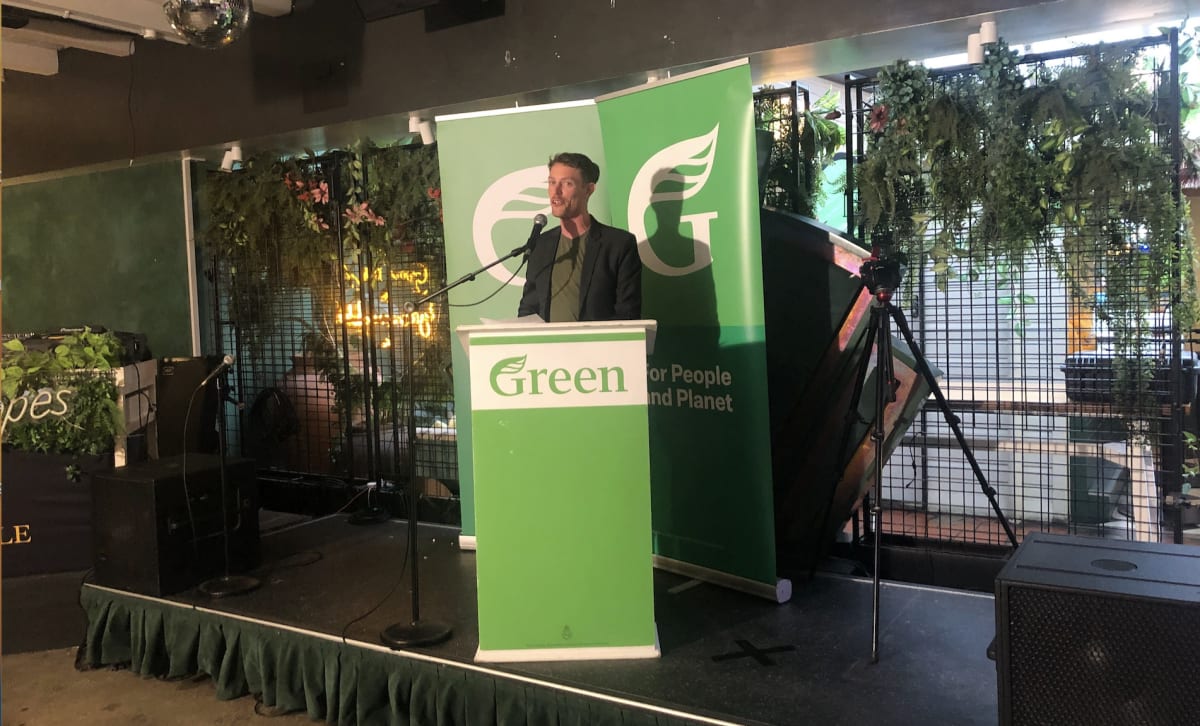

7:00pm Polls are closed!

"Ipsos regularly monitors the key issues New Zealanders are worried about and which party they believe is the most capable of managing those issues. Prior to the 2020 election Labour dominated on the 20 issues on our last wave before their landslide election. This election National is leading on most issues, however not with the same lead as Labour did in 2020 and in our latest report this week we saw respondents who didn’t know which party was more capable of managing issues, move to Labour further lessening the dominance of National. "This is the 2020 picture:

We'll be ramping up our coverage from 7pm – and very soon after that we expect to have the first results from the 1,376,366 New Zealanders who voted in advance of election day. – JM
5:44pm Responding to the concerns we raised with him about problems voting in south Auckland, chief electoral officer Karl Le Quesne tells us a large number of people came out to vote today, and the Electoral Commission has had to bring on extra workers in some parts of the country. "There have been queues at some voting places today due to high demand and additional staff were brought in to support our busiest voting places," he says.
More than 2300 voting places are open until 7pm which is a similar number to previous elections. "We will look into whether the voting places mentioned have run out of forms at any point."
"Our staff are trained on the differences between the Māori and general rolls. When people enrol for the first time, they have the choice to enrol on the Māori or general roll. It is clearly stated on the paper form, and online," he says. "Our staff are also trained on the vote issuing process, and know that if people do not have their EasyVote cards, they can still vote. Our staff will look them up on the electoral roll and issue their voting papers."
He acknowledges there was also an issue with the electronic version of the electoral roll at voting places, which he says has now been fixed. "The app is used to look up people who don’t have their EasyVote card or don’t know which electorate they are in. The issue has had no impact on most people’s voting experience but caused some delays for people casting a special vote at some of our busiest voting places." – JM

"There are large lines at a number of polling booths today and whānau are not waiting. All of this is just bias against not just Māori and Pasifika but also the poor."
5:35pm Chief electoral officer Karl Le Quesne says people already standing in line would not be turned away, when the clock ticks over to 7pm. "If you are waiting at your voting place to vote and it turns to 7pm, you can still stay on the line and cast your vote."
5:40pm We have reports coming in from across south Auckland, and some from Christchurch as well, of voting problems and long queues. There had already been issues at Hoani Waititi Marae and Manurewa Marae during the advance voting period, when they sometimes ran out of voting forms. Now we have reports of the same happening again at the Manurewa Marae. As polling places, these are operated by Electoral Commission staff, not by marae members.
One community worker tells me his 18-year-old son turned up to vote for the first time, but was told he couldn't enrol on the Māori roll.
Earlier today, the electronic voting system went down, causing delays for some people casting their special vote. The Electoral Commission says that problem has since been resolved. – JM
5:30pm Good evening, and welcome to Newsroom.co.nz's live rolling coverage of Election Night 2023. Please keep coming back here and refreshing your browser for the latest from our team and contributors up and down the length of New Zealand. I'm Jonathan Milne, Newsroom Pro managing editor, and I'm joined by news director Cass Mason updating this article with up-to-the-minute analysis.
Around New Zealand, we have our team of senior journalists at election party headquarters and watching for those surprises that every election delivers. Expect the unexpected!
Among those contributing, from the Far North down to Otago/Southland, will be some of New Zealand's leading subject experts from Auckland, Victoria and Otago universities, mayors, community and business leaders, and former senior politicians and prime ministers. Thank to all who are taking part – because we all know accurate reporting and informed commentary matters more than ever. – JM







